Decrypting the RISC Zero product matrix: How to help Ethereum move towards a ZK-based future?

Reprinted from panewslab
12/24/2024·4MAuthor: LINDABELL
At the recent Devcon conference, Justin Drake, a core member of the Ethereum Foundation, proposed the Beam Chain proposal, which plans to upgrade the Ethereum consensus layer through zkSNARK and zkVM technologies to improve the scalability, security and efficiency of the network. This vision also draws attention to the importance of zkVM again. As a general zero-knowledge virtual machine, zkVM can handle complex calculations in a more flexible and efficient manner, while getting rid of dependence on traditional smart contract logic.
Driven by this trend, projects such as RISC Zero, Succinct and Cysic are regarded as important players in promoting innovation in this field. Among them, RISC Zero has developed a series of open source tools such as Zeth, Kailua and Bonsai with zkVM based on RISC-V architecture, which not only improves the performance of block verification and Rollup, but also provides technical support for the ZK upgrade of Ethereum.
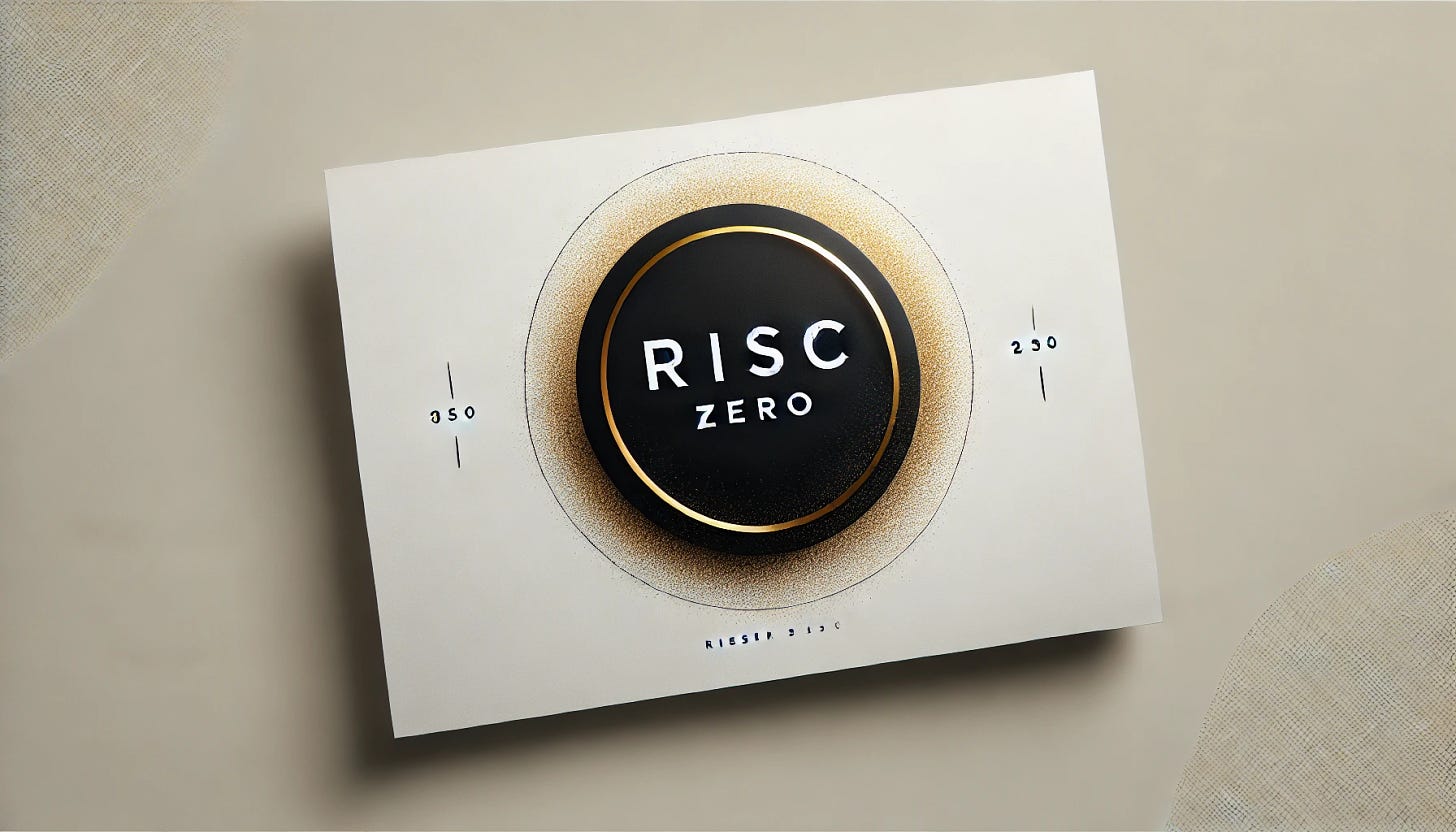
RISC zkVM ecological product matrix: from core technology to scenario
application
RISC Zero is a zkVM implementation based on the RISC-V instruction set architecture. As a general zero-knowledge computing platform, it supports a variety of mainstream programming languages, such as Rust and C++, and can run almost any computing task. Compared with other zero-knowledge technology platforms, RISC Zero's provers and verifiers are completely open source, and developers can generate and verify proofs locally. In addition, RISC Zero’s verifier is compatible with multiple platforms and can adapt to different blockchain ecosystems, simplifying the development process of decentralized applications.
In June this year, RISC Zero released zkVM 1.0. zkVM 1.0 not only supports multiple languages and complex computing tasks, but also uses Continuations technology to divide large-scale calculations into multiple small segments to achieve efficient parallel computing and verification. According to the roadmap, RISC Zero plans to achieve a 20-fold improvement in zkVM performance and cost by the end of 2024. Optimization content includes completely migrating the proof process to the GPU (80% completed), introducing new RISC-V v2 circuit designs, and targeting recursion. Special optimization of circuits, etc. At the same time, RISC Zero is integrating a series of acceleration modules for algorithms such as RSA, Keccak, and ECDSA to improve the performance of Ethereum-related tasks and encryption operations.
Focusing on the core capabilities of zkVM, RISC Zero has also developed a series of open source tools and products. For example, by providing proof services through the Bonsai network, developers can generate zero-knowledge proofs without the need for dedicated hardware; through the Steel tool, complex EVM calculations can be transferred to an off-chain environment for operation, while keeping the results verifiable, reducing on-chain execution costs; Blobstream Zero provides more possibilities for data sharing and verification in the modular blockchain ecosystem by bridging the Celestia data availability layer.
Zeth: Prove that the entire Ethereum block was correctly constructed
Zeth is an open source Ethereum zero-knowledge block prover developed by RISC Zero based on its zkVM technology. It can verify the validity of Ethereum blocks through zero-knowledge proofs without relying on traditional validators or synchronization committees. RISC Zero defines Zeth as Type-0 zkEVM, which is fully compatible with the Ethereum protocol and improves development efficiency through code reuse.
Vitalik Buterin, co-founder of Ethereum, divided zkEVM into four categories in the article "Different types of zk-EVMs". Type-1 strives to be completely and uncompromisingly equivalent to Ethereum; Type-2 strives to be completely equivalent to EVM, but not completely equivalent to Ethereum; Type-3 is almost equivalent to EVM; Type-4 is completely incompatible with Ethereum.
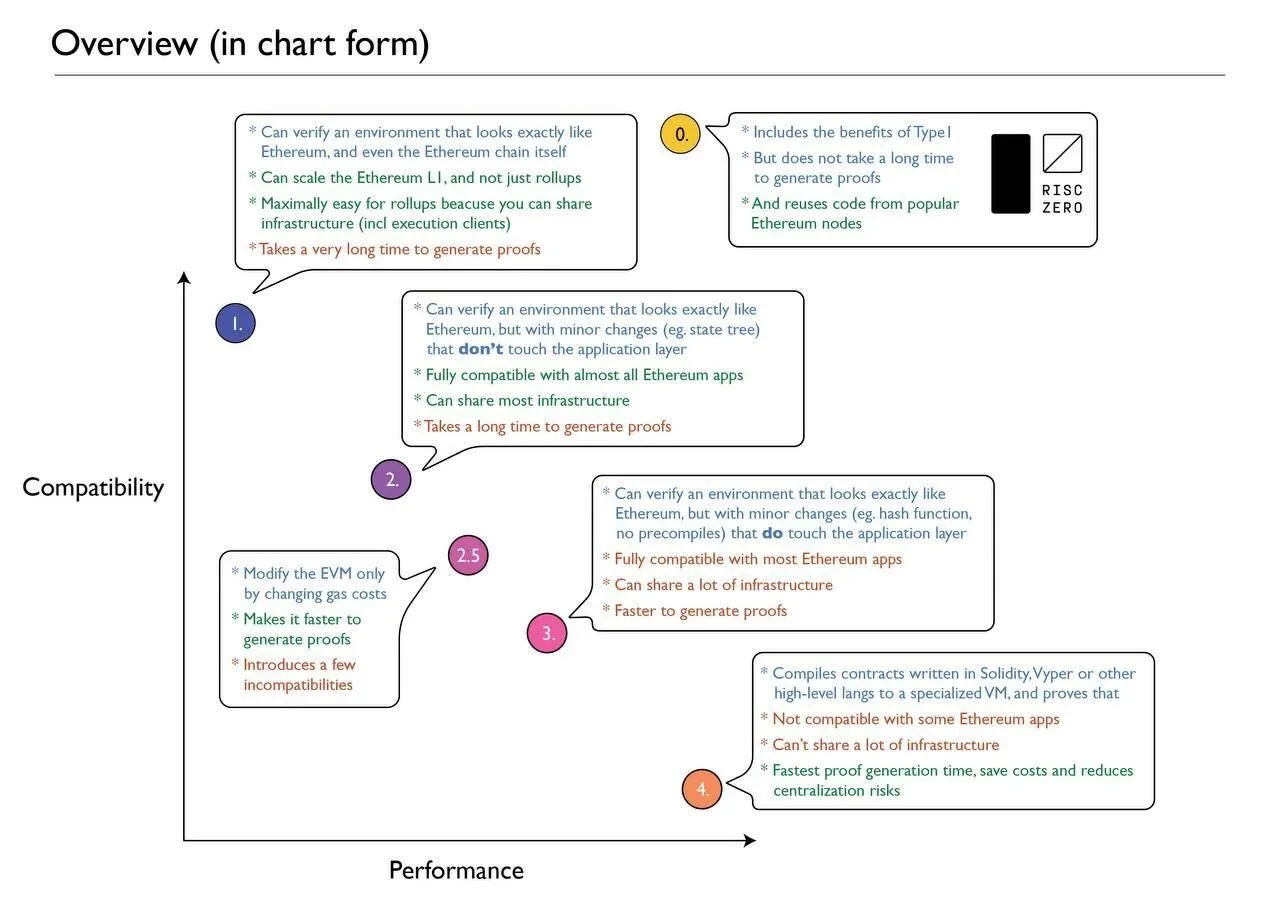
Thanks to the high performance of RISC Zero zkVM, Zeth is able to complete the verification of Ethereum blocks in minutes. Test data shows that Zeth can generate block proofs at a speed of 1.1 MHz, and expands the GPU cluster through the "continuations" feature to increase the speed to 4.7 MHz to 6.3 MHz. This performance optimization also reduces the cost of proof generation. According to testing, a block containing 182 transactions has a proof generation cost of only $21.72, and each transaction costs approximately $0.11.
At the same time, during the development of Zeth, the RISC Zero team made full use of components of the Rust ecosystem, such as revm, ethers, and alloy, allowing developers to quickly implement the block proof function and apply it to different scenarios. This design provides developers with more flexibility to adjust block construction logic as needed and adapt to future Ethereum improvement proposals.
At the application level, Zeth provides efficient solutions for zk rollup, light clients and cross-chain bridges. The construction of traditional zk Rollup and zkEVM requires a lot of time and money, which is prohibitive for small teams. Zeth is based on the modular zkVM architecture, allowing developers to easily customize block verification logic. For example:
- zk Rollup: Zeth can quickly implement block proof, shorten the development cycle of ZK Rollup and reduce capital investment.
- Light client: Verify the validity of the block without rebuilding the block, reducing operating costs.
- Cross-chain bridge: Zeth can verify the correctness of cross-chain data without leaking sensitive information on the chain through ZKP, which reduces reliance on third parties and reduces the risk of cross-chain attacks.
In May this year, Zeth successfully expanded to support extracting Optimism block data from the Ethereum main network, generating ZKP to verify the correctness of the block, and also supporting verification on the chain. In other words, with Zeth, Optimism can verify transactions more efficiently and resolve transaction disputes.
**Bonsai: allows developers to generate proofs without using their own
hardware**
Bonsai is a remote proof service designed specifically for zkVM applications, allowing developers to generate proofs without using their own hardware, thus solving the contradiction between limited on-chain computing resources and high costs. Through Bonsai, developers only need to define the zkVM application and input data that need to be executed, and Bonsai can run the calculation in the background and generate the corresponding zero-knowledge proof. This process does not require developers to deploy additional hardware equipment. At the same time, Bonsai utilizes a large number of GPU clusters to support parallel processing of multiple computing tasks. In addition, Bonsai provides simple and easy-to-use API and SDK interfaces, allowing developers to easily integrate it into existing systems, further reducing development difficulty.
Based on this remote certification service, RISC Zero launched the open source tool Bonsai Pay, which combines OAuth2.0 identity authentication and ZKP technology to enable users to send or receive tokens on the Ethereum network through Google accounts. For example, when Alice wants to transfer funds to Bob, Alice can enter Bob's Google email address and transfer amount through Bonsai Pay. Bob can then log into Bonsai Pay, enter his email address and complete Google account authentication. Bonsai Pay will use OAuth 2.0 to generate authorization tokens to prove that Bob is indeed the holder of the email address. Bonsai Pay then calls the Bonsai proof service to generate a zero-knowledge proof to prove that Bob's Google account is associated with the wallet address. After the smart contract verifies the proof, it unlocks the funds and transfers them to Bob's wallet address.
Throughout the process, Bonsai Pay used ZKP technology to verify the fact that "Bob's Google account is associated with the wallet address" while avoiding leaking any specific information about the Google account.
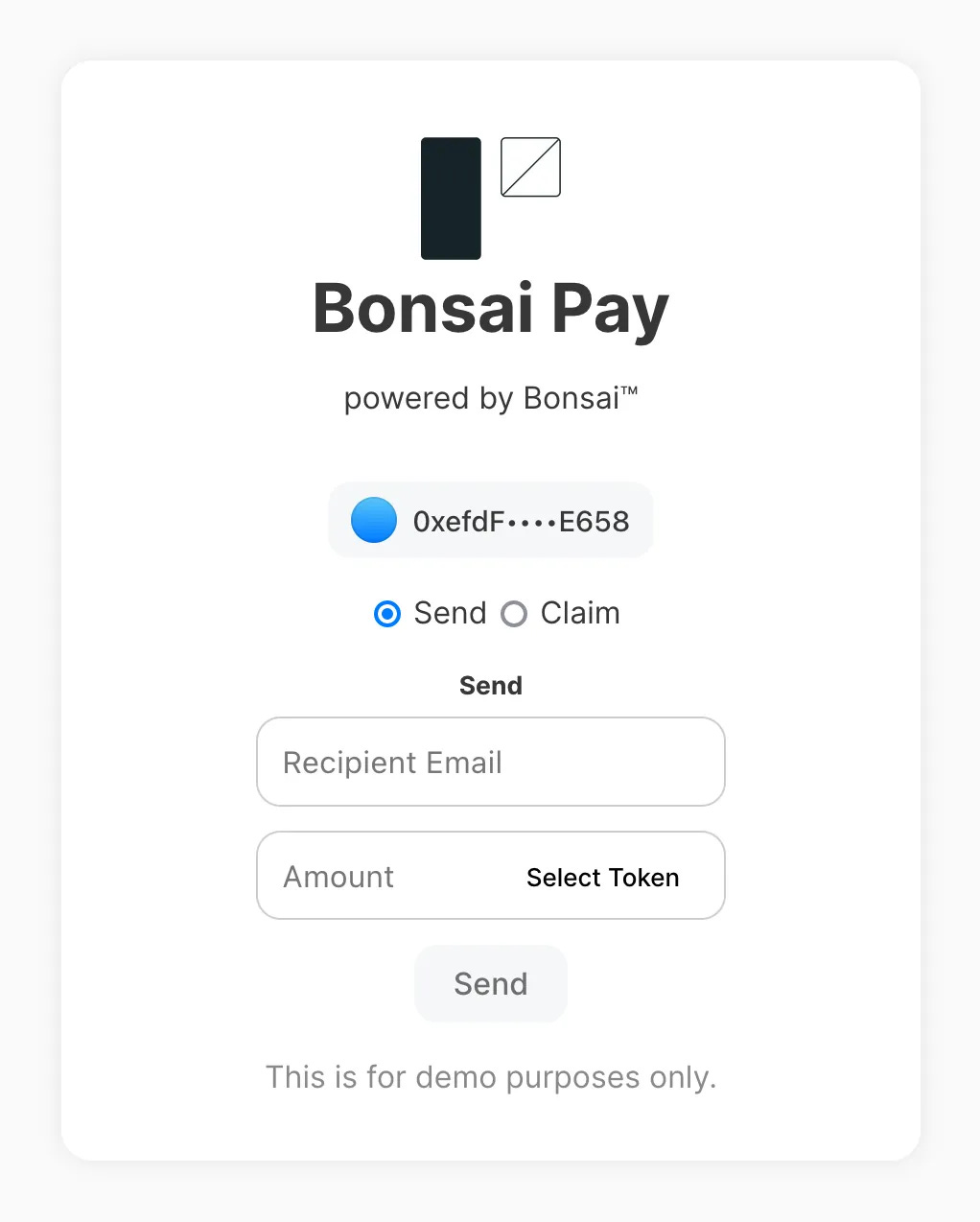
Another important application of Bonsai is the Bonsai ZK co-processor (ZK Co-processor). It uses zero-knowledge proof technology to transfer complex computing tasks from the chain to the off-chain, and generates tamper-proof proofs to ensure the correctness of the results. At the same time, the deployment of Bonsai coprocessor is also very simple. Developers only need to write a zkVM application to process the logic, and call Bonsai through a simple Solidity contract to run the calculation and verify the results. Throughout the process, the Bonsai Proof Service is responsible for generating off-chain zero-knowledge proofs that can be verified on-chain.
Bonsai ZK coprocessor is suitable for on-chain applications that require high performance and low cost. For example, in DAO governance, it can transfer complex voting calculations off-chain, significantly reducing on-chain Gas fees. Bonsai DAO Governor reduces the gas cost of each vote by more than 50% through the co-processor, effectively improving governance efficiency and lowering the participation threshold.
Boundless: verifiable computing layer
In the traditional blockchain architecture, in order to ensure the validity of transactions, all nodes need to repeatedly perform all calculations for each transaction. Although this "global re-execution" mode can ensure security and consistency, it also brings extremely high computing costs. To solve this problem, RISC Zero launched Boundless, which allows a single node to generate a verifiable zero-knowledge proof after completing the calculation. Other nodes only need to verify the proof to confirm the result without repeating the calculation.
Boundless simplifies the verification process through recursive composition techniques. It combines multiple small zero-knowledge proofs into an overall proof, allowing the verifier to only check one overall proof instead of having to verify all stages of the proof one by one. In order to further optimize the generation efficiency of zero-knowledge proofs, Boundless has built-in dedicated cryptography acceleration circuits to optimize the efficiency of common tasks such as hash calculations and digital signature verification.
In addition, developers using Boundless do not need to have an in-depth understanding of zero-knowledge technology. They only need to write applications in familiar programming languages such as Rust or Solidity. Currently, Boundless is open to developers for free access. Developers can use the proving service provided by Boundless to quickly build and deploy zero-knowledge applications on any blockchain without migrating existing systems or updating verification contracts.
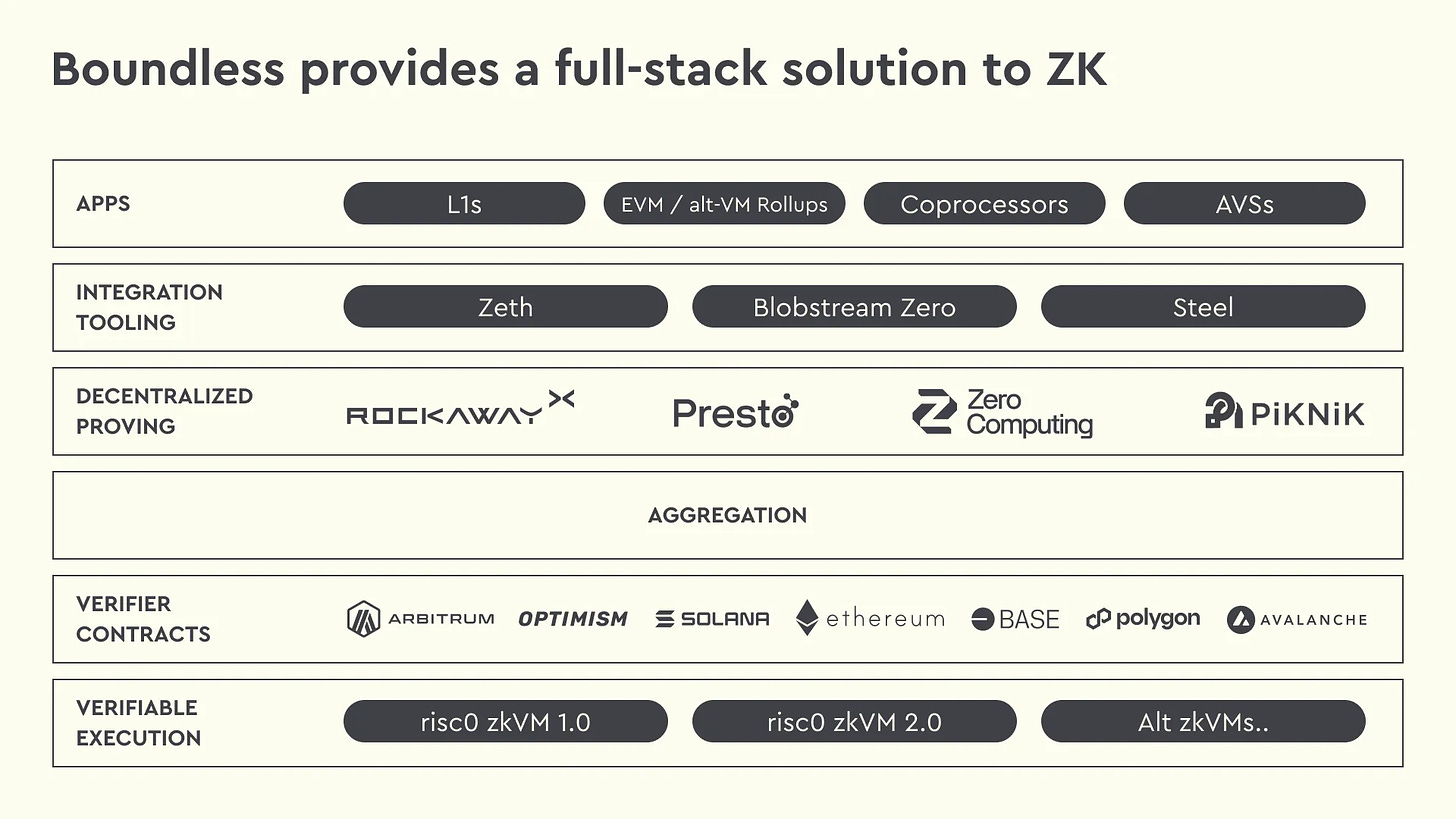
**Blobstream Zero: zkVM’s cross-chain bridge that simplifies cross-chain
data verification**
Blobstream Zero is a zkVM-based cross-chain bridge jointly launched by RISC Zero and Celestia, aiming to seamlessly connect Celestia's data availability layer to the existing modular blockchain ecosystem. By sharing and verifying data on Celestia, Blobstream Zero enables more convenient data transmission and verification between chains.
As a completely open source public product, Blobstream Zero allows any project or developer to run a local instance and generate zero-knowledge proofs. In addition, Blobstream Zero provides support for the ZK coprocessor. The ZK coprocessor is essentially an off-chain computing tool and therefore requires reliable data to perform calculations. Blobstream Zero can obtain data from blockchains such as Celestia, and can prove that the transmitted data is reliable by generating ZK proofs.
**Steel: A new paradigm for smart contracts with off-chain execution and
on-chain verification**
Steel is an open source tool launched by RISC Zero, which uses zkVM technology to implement off-chain verifiable smart contract execution. Through Steel, developers can transfer EVM operations from on-chain to off-chain execution while generating zero-knowledge proofs to ensure the authenticity and verifiability of calculation results.
Traditional smart contracts require complete execution of all logic on the chain, which not only results in high gas costs but also limits the development of complex applications. Steel's off-chain calculation and on-chain verification mechanism solve this problem. For example, in a simple smart contract, determine whether the ERC20 balance of an account is greater than 1 and increment the counter variable. Traditional methods require complete execution of logic on the chain, while Steel completes calculations off-chain and generates zero-knowledge proofs. The proofs only need to be verified on the chain without the need to repeatedly execute the contract logic.
Currently, RISC Zero has released Steel 1.0, and partners have already developed applications using this tool. For example, in a contract call that handles approximately 400,000 SLOAD operations, Steel transfers the calculation to off-chain execution, and then verifies the generated zero-knowledge proof on the chain. The proof generation cost is less than 10 US dollars, and the on-chain verification cost is less than 300,000 Gas.
**Kailua: A hybrid ZK solution that promotes innovation in Rollup
architecture**
Following the release of Zeth, RISC Zero launched Kailua, which aims to provide a hybrid ZK Rollup upgrade solution for optimistic rollup. Traditional optimistic rollup usually requires a 7-day challenge period, resulting in slower transaction finality. Although ZK rollup can quickly achieve finality, the cost of continuously generating zero-knowledge proofs is too high. Kailua combines the best of both worlds, achieving a balance between cost and efficiency through a hybrid architecture. As an extension of the Optimism Kona framework, Kailua not only supports unmodified Kona running on zkVM, but also introduces an innovative dispute resolution mechanism that lowers staking requirements and reduces finality delays, thereby improving system efficiency and availability.
In Kailua's architecture, the dispute mechanism adopts a completely new design. First, its dispute resolution mechanism removes time limits, allowing validators sufficient time to generate proofs when encountering special circumstances such as network interruptions, thereby enhancing the system's resilience. Even in extreme cases, RISC Zero zkVM’s scaling architecture can still prove it in under an hour. In addition, Kailua's on-demand verification feature allows developers to flexibly configure verification frequency and gradually transition to a fully verified rollup mode at a lower cost.
Unlike ZK Rollup, Kailua is designed without continuously generating proofs. For low-frequency empty blocks or rollups with special contract requirements, Kailua provides a more cost-effective option. At the same time, Kailua has also significantly reduced Rollup’s staking cost requirements. The pledge amount of a traditional optimistic rollup will increase linearly with a longer finality period, while Kailua's optimized design fixes the pledge requirements, allowing the system to maintain security and activity at a lower cost even in a long period.
Currently, Kailua is fully open source. Developers can use its command line tools to deploy a local Optimism test network and quickly upgrade to a network that supports ZK failure proofs. Kailua also supports simulated fault proposals, helping developers understand how validators challenge error states through zkVM to gain a deeper understanding of its dispute resolution mechanism. In the future, Kailua will further optimize cost and performance, and expand to support more Rollup frameworks.
Summarize
As can be seen from the above, RISC Zero's zkVM product matrix is promoting the development of zero-knowledge proof technology in multiple fields. Zeth and Kailua focus on optimizing the Rollup architecture, improving block verification efficiency and dispute resolution speed. Bonsai provides remote certification services, reducing hardware dependence and operating costs, allowing developers to build applications more efficiently. Blobstream Zero provides reliable support for the modular blockchain ecosystem by efficiently verifying cross-chain data. In addition, Steel reduces the Gas cost of smart contract execution through off-chain calculation and on-chain verification.
Of course, while continuously improving the zkVM product matrix, RISC Zero also continues to promote innovation in the underlying technology of zkVM. Recently, RISC Zero zkVM released version 1.2, which introduces a new pre-compilation method that allows developers to deploy pre-compiled logic with applications without building it into zkVM itself. This means that developers can add new precompiled logic without modifying the configuration of on-chain verification contracts or coordinating provers, and can achieve performance optimizations without forking or major changes to zkVM. Additionally, by applying definition precompilation, the computational cost of proof generation can be reduced. For example, after Automata integrates RSA precompilation, the execution cycle is reduced from 39 million to 217,000, and the cost is reduced by about 180 times.
As zkVM technology continues to be optimized, its development potential will be gradually reflected in multiple application scenarios. However, if we want to better unleash these potentials, we still have to rely on the actual performance of ecological collaboration and technology implementation.


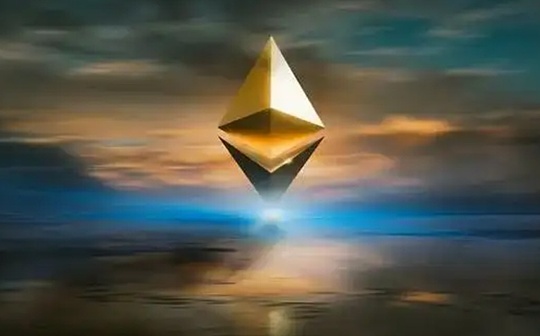
 jinse
jinse

 chaincatcher
chaincatcher